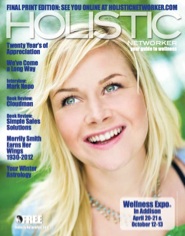The grassroots hit movie “What the Bleep Do We Know” has stimulated many discussions about quantum physics and the notion that we create reality with our minds. The movie has also put a spotlight on the work of Dr. Masaru Emoto, whose photos of frozen water crystals suggest that water is sensitive to the energy of music as well as the subtle energy of words, thoughts, and prayers.
Some journalists criticize work such as that of Dr. Emoto, calling it “pseudoscience.” These critics belong to what I call “the cult of science.” They embrace a belief system that differs from fundamentalism only in its degree of dogmatism. You see, while fundamentalist preachers attempt to persuade you with fear of eternal damnation, some science zealots try to persuade you with facts.
These science zealots preach that measurable facts must be accepted as “the way the world is”, and that only irrational people would dispute facts. Facts, however, represent only one viewpoint on reality. Other viewpoints and other facts can be equally useful in describing the world. For instance, light appears to be made of particles that can be measured by carefully counting photons. Yet, focus a light through a double-slit partition, and it behaves like a wave by casting a shadow that resembles a wavelike pattern. Light’s nature and the nature of reality, depend on how we look at it. This relativistic viewpoint at the core of quantum reality does not pretend to be the ultimate truth, rather, it represents a new description of reality with far fewer limitations on the apparent solid nature of the world.
Our knowledge, makes great leaps when visionaries with keen powers of observation see beyond the accepted description of reality—these scientists create a new paradigm—a new way of looking at the world. The danger, of course, in seeing things differently is criticism from people who cannot yet imagine the new reality. Galileo faced harsh criticism by suggesting that his belief system, science, had more relevant answers than the prevailing power, the Vatican. Throughout the 1900s, science replaced the Church as the predominant authority on reality. Yet, we are beginning to experience a shift in viewpoint as physicists, mystics, and ministers question the authority of science-based factualism.
Quantum reality brings science full circle: back to spirit. This new description of the world embraces the immeasurable realms of probability, choice, and intention. This viewpoint reaffirms our Divine nature to shape reality. As the quantum worldview of reality becomes more accepted, more people will experience interesting phenomena with greater regularity. I believe that the experiences of synchronicity, intuitive knowing, precognition, mediumship, and other phenomena that are ridiculed today as pseudoscience, will be widely accepted and experienced as reality in the near future.
About Tony Cecala
Tony is a business strategist. He publishes the Holistic Networker and produces the Wellness Expo. In his spare time he reads about technology and the mind.
- Web |
- Flickr |
- More Posts(165)










